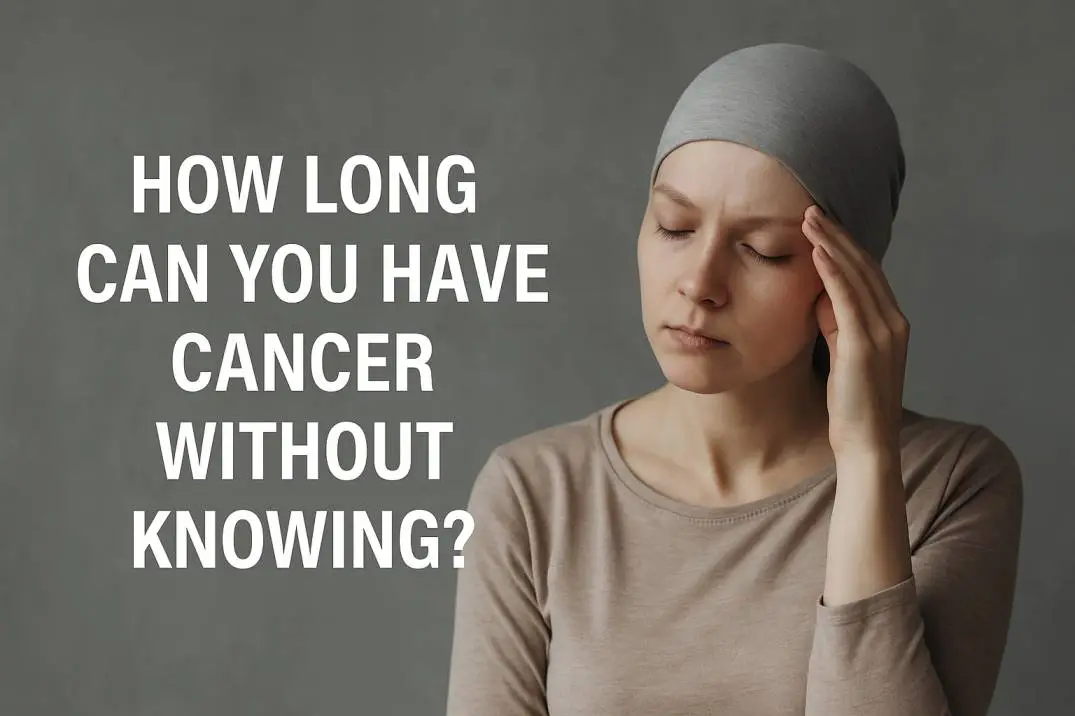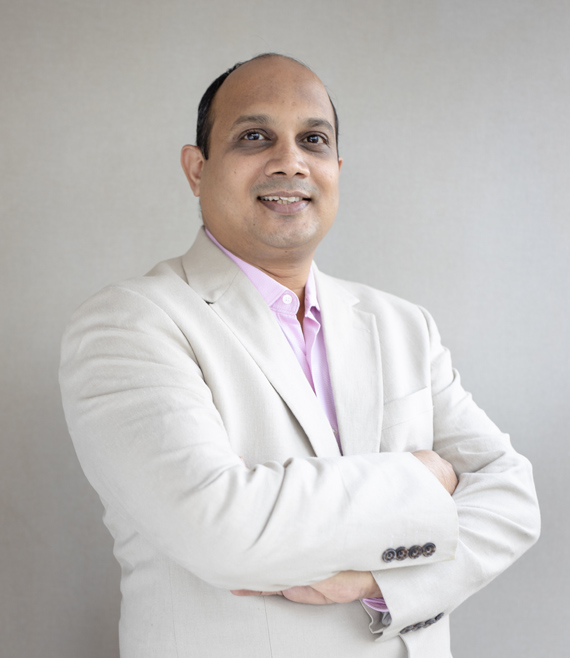Home > All Blogs > How Long Can You Have Cancer Without Knowing?
How Long Can You Have Cancer Without Knowing?

It’s possible to have cancer for months or even years without knowing, depending on the type, its growth rate, and where it is located in your body.
Some cancers, like prostate or breast cancer, can grow silently for a long time, showing no clear warning signs.
Others, like pancreatic or lung cancer, may go unnoticed until they are in advanced stages.
Early detection significantly improves your chances of effective treatment, so regular check-ups and understanding symptoms are essential.
This article will cover:
- What happens during the early stages of cancer?
- Why can some cancers go undetected for years?
- Cancers that are typically diagnosed late
- Key signs and symptoms to look out for
- How to protect yourself with routine check-ups and screenings
- When should you see a doctor?
By the end of this article, you’ll have a clearer understanding of how cancers can go unnoticed, what steps to take, and when to seek medical attention.
What Happens During the Early Stages of Cancer?
Cancer begins when cells in your body grow abnormally and don’t behave like healthy cells.
At first, these abnormal cells may create very small growths or tumors that don’t affect your body’s normal functions.
This is why you might not feel or notice any changes in your health in the early stages.
Why Don’t You Notice Cancer Right Away?
Many cancers in their early stages are asymptomatic. This means they cause no noticeable symptoms or discomfort. For example:
- Slow-growing cancers (like prostate cancer) often take years to grow large enough to cause trouble.
- Size and location matter. A tumor in small but vital areas (like the brain) may cause symptoms faster than one in larger, less sensitive organs.
- The body adapts. Our body can sometimes adjust to changes caused by cancer, masking the symptoms.
Imagine a small crack in a wall in your house. You may not notice it until it gets bigger.
Similarly, your body doesn’t always “feel” a tumor until it reaches a size or stage where it starts interfering with normal functions.
I once consulted a patient named Anil (name changed for privacy) who came in for what he thought was back pain.
After an MRI, we found a small tumor pressing against a nerve. It turned out to be kidney cancer. Thankfully, it was caught early because he didn’t ignore his pain.
Need help? Talk to Our Cancer Surgeon
Get the Most Effective Cancer Treatment in India by Consulting Dr. Nilesh Chordiya, One of the best Cancer surgeons in mumbai.
Why Can Some Cancers Go Undetected for Long Periods?
The time cancer remains undiagnosed often depends on several factors:
- Growth Rate
Slow-growing cancers, like some types of prostate or thyroid cancers, can develop over 5 to 10 years before causing noticeable issues. - Vague Symptoms
Some cancers, like ovarian cancer, cause symptoms (like bloating or stomach discomfort) that may feel very common or unrelated to something serious. - Lack of Screening
For cancers that don’t have routine screening methods, like pancreatic or kidney cancer, detection often happens when symptoms force a person to see a doctor. - Ignoring Changes in Health
Minor symptoms like fatigue or minor bleeding are often written off as stress or everyday issues. Unfortunately, this delay can allow cancer to progress further before diagnosis.
Which Cancers Tend to Hide the Longest?
Here’s a quick look at cancers that commonly go unnoticed until later stages:
- Prostate Cancer
Often slow-growing with mild symptoms like trouble urinating. - Breast Cancer
Small lumps may not be felt early on but can be caught by mammograms. - Colon Cancer
Polyps in the colon grow slowly, usually causing symptoms like blood in stools much later. - Lung Cancer
Persistent cough or chest pain might only appear when the cancer is advanced. - Pancreatic Cancer
Symptoms like upper belly pain or jaundice might appear too late.
For comparison, visible cancers like skin cancer are often diagnosed earlier because you can see changes, like unusual moles, on your body.
Key Signs and Symptoms You Should Never Ignore
While not all symptoms are signs of cancer, there are a few “red flags” that deserve attention. If you notice any of these, consult a doctor immediately!
Common Signs and Symptoms:
- Unexplained Weight Loss
Losing weight without trying is a common early sign of cancers like stomach, lung, or pancreatic cancer. - Fatigue That Won’t Go Away
Persistent tiredness even after rest may point to cancers like leukemia. - Bleeding Without Explanation
Blood in stools, urine, or coughing up blood should be checked right away. - Changes in Skin or Moles
Growth, discoloration, or bleeding moles can indicate skin cancer. - Pain or Swelling
Pain in areas like the bones, back, or abdomen could be an early sign. - Persistent Cough or Hoarseness
This may indicate lung cancer or even throat cancer. - Lumps or Unusual Growths
Any new lump or bump, such as in the breast or the neck, is worth exploring.
A Practical Checklist
If you notice:
- Changes lasting longer than 2-3 weeks (e.g., unexplained cough, pain).
- Lumps that grow or change quickly.
- Symptoms that affect your daily life (like difficulty swallowing).
Make it a point to see a cancer doctor. Early assessment often saves lives.
The Role of Early Detection
Catching cancer early is essential.
Why? Because cancers found in their early stages often have better outcomes and may respond to less invasive treatments.
What Are Some Early Screening Tests?
- Pap Smears and HPV Tests
For early cervical cancer detection. - Mammograms
For identifying breast cancer before symptoms develop. - Colonoscopy
Detects colon polyps or cancer early. - PSA Blood Test
Helps identify prostate cancer. - Annual Skin Checks
To catch skin cancers like melanoma.
Remember, early detection allows for more treatment options and less aggressive measures.
Can You Prevent Cancer from Hiding?
While you can’t always prevent cancer, you can stay vigilant with regular health check-ups and by knowing your body well.
Screening tests save lives because they catch problems early, even if you’re feeling fine.
A woman in her late 40s, who had no apparent symptoms, came to my clinic for her routine health check-up. Her mammogram revealed a small, early-stage lump that was successfully treated. This reinforces how routine tests can make all the difference.
Actionable Tips to Stay Ahead
Here’s what you can do to reduce the risk of cancer going unnoticed:
- Make Routine Check-Ups Non-Negotiable
Visit your doctor annually for a full-body check. - Listen to Your Body
A small ache or unusual bleeding might be signalling something. - Don’t Skip Recommended Screenings
If you’re over 40 or at risk, don’t delay tests like mammograms or colonoscopies. - Adopt a Healthy Lifestyle
Avoid smoking, eat a balanced diet, and exercise regularly. - Seek Medical Attention Early
If anything feels “off,” consult a cancer doctor in mumbai rather than waiting.
When Should You Visit Your Doctor?
Call your doctor immediately if you notice:
- A lump you’ve never felt before.
- Pain or discomfort that gets worse or doesn’t fade.
- Any bleeding that seems unusual.
To offer personalized advice, I, along with many healthcare professionals in Mumbai and Thane, provide timely consultations and screenings to address concerns before they worsen.
Final Thoughts
To sum up, it’s possible to have cancer without knowing for months or even years, but early action can make all the difference. Staying on top of screenings, being aware of symptoms, and consulting a doctor promptly offers the best chance for effective treatment.
If you’re looking for answers or to schedule a routine screening, reach out to a trusted specialist. Remember, your health deserves priority, and being proactive is often the best medicine.
APPOINTMENT FORM

About Author
Related Blogs
Cervical Cancer vs. Uterine Cancer: What Is the Difference?
Cervical cancer starts in the cervix from HPV, while uterine cancer begins in the uterus lining due to hormonal imbalance.
Connection Between HPV and Cervical Cancer
HPV is the main cause of cervical cancer, but vaccines and regular screening can help prevent it before it turns serious.
Cervical Cancer Vaccine Cost in India
Cervical cancer vaccine in India costs ₹2,000–₹10,000 per dose. Free or low-cost options available via govt programs and Cervavac.


